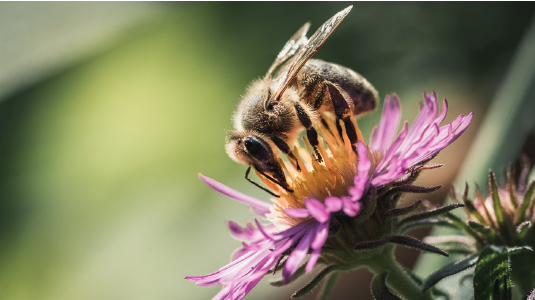SFC news published since 2018. See SFC archived content for earlier news articles.
Building more productive, inclusive and climate-resilient food systems in alignment with GCRF priority challenge areas and the UN Sustainable Development Goals.


The GCRF is a £1.5 billion UK fund to support cutting-edge research that addresses the challenges faced by developing countries.
This year £11.8m in GCRF funding has been allocated to SFC by the Department of Business, Energy and Industrial Strategy (BEIS), up from £10m in 2018-19. Since 2016-17 GCRF has supported more than 400 projects led by Scottish universities, involving over 70 developing countries.
One example of this work is ‘Sustainable Beehives and Pollination’, a project aimed at establishing and developing a relationship between Edinburgh Napier University and the Oromia Agricultural Research Institute (OARI) near Addis Ababa, specifically on the topic of beekeeping.
In Ethiopia beekeeping traditions date back more than 5000 years (3500 – 3000 BC). To this day it remains an integral part of the rural community, with about 1.8 million households involved and earning various levels of annual income from modern or traditional beekeeping methods.
Endowed with more than 7000 species of flowering plant, 80% of which can provide resources for any of its five honey bee subspecies, Ethiopia is the leading honey and beeswax producer in Africa and is third in the world for honey, and fourth in the world for beeswax.
However, production potential vs actual yield of Ethiopian honey and wax are far apart. Current honey production is estimated at just 1/10th of potential yield. Our project focused on clarifying the issues behind this, and improving the overall sustainability of beekeeping in Ethiopia – by progressing interdisciplinary research and knowledge sharing.
The goal of this kind of work is to build more productive, inclusive and climate-resilient food systems, in alignment with GCRF priority challenge areas and UN Sustainable Development Goals.
For our project we brought a diverse team of researchers together, from building engineering to bee conservation experts, and held a series of workshops and outreach activities with project partners like the Holeta Bee Research Centre and community stakeholders, including local beekeepers.
Discussion with local beekeepers refined our understanding of their challenges and aspirations. They explained that, despite the high engagement and aspirations of the local community, costs related to the uptake of modern beekeeping, such as the hives themselves and equipment needed to maintain hives and process product (wax sheets for new frames, extraction and processing of honey and wax), were prohibitive.
The lack of wax production from modern beehives was also found to be an issue for local beekeepers, who value this additional product. Aspirations from the local community are to provide the needed equipment and the means to build their own modern hives that take into account Ethiopia’s local resources and climate constraints (e.g. heat stress at midday).
There is also huge potential to incorporate beekeeping in existing development infrastructure to promote the economic empowerment of women. An all-female community group we visited had an existing relationship with an NGO, which arranged a zero-commission broker through which to sell their produce. The broker will provide access to markets for honey when production begins. Such economic success leads to higher social standing and other societal benefits for women in such communities.
Concerning the productivity and uptake of modern beekeeping, we found there are a number of technical, knowledge transfer/skills and environmental issues. In particular, environmental degradation and excessive pesticide use has resulted in wild bee populations declining, making even traditional hives expensive in many areas. The lack of awareness and misuse of pesticides is resulting in high exposure and death of insects, including honeybees, as well as a decrease in crop yield, due to resulting pollen limitation.
Climate change has also been found to affect plant life cycles (and likely insects) with honey harvest now down from twice a year to just once in some areas, and a drier climate has resulted in more honeybees absconding.
A number of solutions were proposed, including using cheaper materials as alternatives for hive construction, education and training on pesticide awareness, and careful breeding of certain bee subspecies to reduce their aggressiveness – as this can limit the ability of beekeepers being able to check hives during the day, and checking at night in poor lighting can results in bee deaths. A better understanding of the distribution and abundance of non-honeybee pollinator species will also support redundancy in pollination services.
By considering these serious concerns and ranking the impact of potential solutions, four main research challenges were put forward to develop an Action Plan:
- Reduce pesticide impact on honeybees.
- Reduce cost of beekeeping.
- Improving lifelong learning in beekeepers.
- Identify resilient crop pollinator communities.
We believe that the outcomes from these workshops set out a clear path for relevant opportunities for future collaborative projects, which could have significant impact for the development of Ethiopia.
This work has shown that beekeeping has a very important role in Ethiopia’s culture and for local livelihood, that current practices are unsustainable by international standards, that government does provide support in these areas but policies are not aligned, and that a range of barriers, both technical and non-technical, will need to be overcome if a positive impact is to be achieved.
The team will now develop a follow-on research proposal to explore these challenges in more detail and identify further collaborators and specific funding calls to progress these projects forward. If you are interested in working with us, or would like to know more, please contact us by email: Dr Céline Garnier (c.garnier@napier.ac.uk) / Dr Gavin Ballantyne (g.ballantyne@napier.ac.uk).

